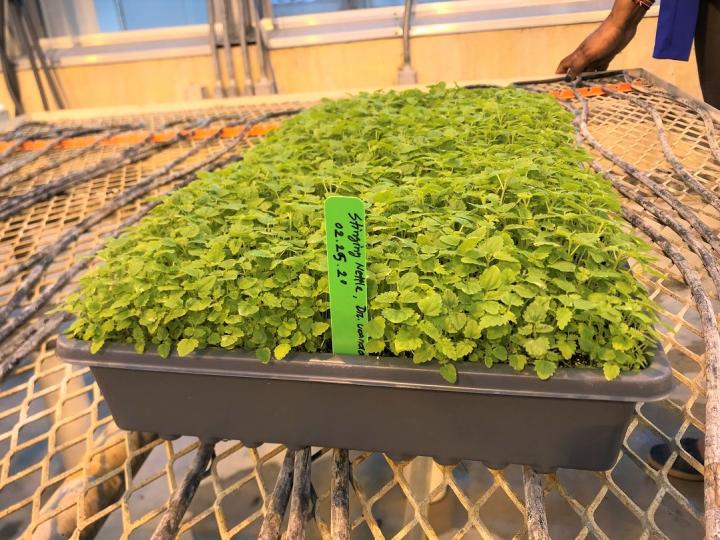Research moves beyond examining nettle as a supplement to examine its benefits as a food

Credit: Obanda Lab, University of Maryland
Obesity, diabetes, and overall immune system health are issues that are all top-of-mind right now, especially during the pandemic. To examine how your diet can help prevent issues with these chronic illnesses, the University of Maryland (UMD) was recently awarded a grant from the United States Department of Agriculture National Institute of Food and Agriculture (USDA-NIFA) to explore nettle as a functional food. Including this plant in your diet may provide protection against excessive weight gain, insulin resistance, and even promote positive changes to your gut bacteria that can bolster your immune system. While nettle extract has been studied previously as having benefits and is readily available on the market, nettle has been scarcely examined as a functional food that provides protective benefits in the diet. Its effects on the gut microbiome, the ever-changing balance of bacteria in your gut that impacts the health of your immune system, is also largely unexplored. With this work, researchers are hoping to discover how nettle can potentially help improve public health.
“We need food for energy and nutrients for daily functioning, but a functional food is a step beyond just food,” explains Diana Obanda, assistant professor in Nutrition & Food Science at UMD and principal investigator. “It has specific health effects that it provides to your body aside from just energy and nutrients. It is not a drug or a medicine, but it can prevent certain diseases. In my lab, I focus on functional foods that are important for the protection of metabolic health. They are not a substitute for exercising and living a healthy lifestyle, but they provide extra health benefits to provide an overall protective effect for better health.”
As Obanda describes it, metabolic health or heart health is closely linked to the health of your gut microbiome. “In this grant, we are proposing to find out how the changes in the gut microbiota affect obesity mechanisms,” says Obanda. “The species of bacteria that increase or are reduced because of nettle in the gut, what do they do to affect the immune system and obesity? How do the phytochemicals in the nettle change or affect these bacteria species, and how do those mechanisms function to affect indicators for obesity and diabetes?”
But the gut microbiome can do more than affect metabolic health. Most think of the gut as the largest center of your immune system, meaning that changes in the gut microbiota lead to changes in the strength of your immune system.
“A very large portion of the immune system is in the gut,” says Obanda. “And the bacteria in the gut affect the immune system. And from previous work, the immune system is related to obesity mechanisms. The gut bacteria shapes the immune system, and the immune system also shapes the gut bacteria, so it is a cycle that we don’t know much about. The innovation of this work is trying to elucidate how this speciality food impacts our health through the microbiota, and then going on to pinpoint what exactly happens to translate that into beneficial effects.”
Obanda has a special interest in plants like nettles and other functional foods like kale that are gaining popularity in the U.S., but have always been a regular part of the diet in countries like her home country of Kenya. “Nettles have been studied for a very long time in different cultures, and they grow all over the world really,” says Obanda. “You find a lot in previous work about nettles as a food in some cultures, and the extract is marketed and widely available as a supplement. But nobody had studied nettle as a food for health benefits, and so I wanted to study it as a functional food in the diet. Does it have a similar effect?”
In order to examine this question, Obanda worked with the Green Farmacy Garden in Fulton, Md. This expansive garden was started and maintained by the late researcher James (Jim) Alan Duke, an esteemed scientist at the USDA and a firm believer in the medicinal benefits of foods. Here, Obanda was able to gather authentic nettle for her preliminary work and the studies she will be conducting as a part of this new USDA grant. She has also collected seeds and planted some nettle at the UMD Research Greenhouse Complex to continue her work. Obanda has been studying nettle for five years now, and is looking forward to taking this work further, from basic science to applied and public health practice.
“My goal as a basic scientist is to understand the mechanisms of how things work, but ultimately to get collaborators who do clinical studies,” says Obanda. “We do our basic studies in cells and animal models, but then in order to have a broader impact, the work needs to go further to apply what we learn. I’m looking forward to forming collaborations with scientists across clinical science and public health to help translate this work into usable data for the general public health.”
###
This work is funded by the United States Department of Agriculture National Institute of Food and Agriculture (USDA-NIFA) Award #2021-67017-34025.
Media Contact
Samantha Watters
[email protected]
Original Source
https:/




